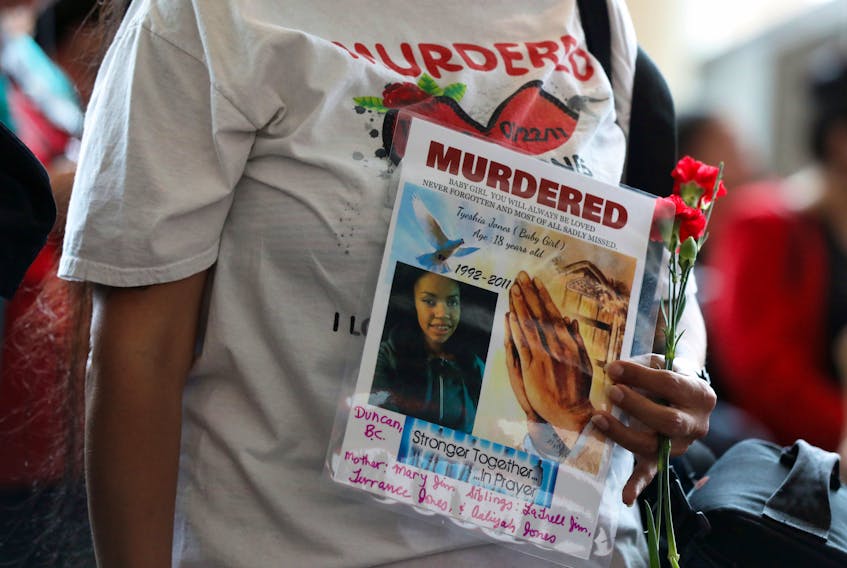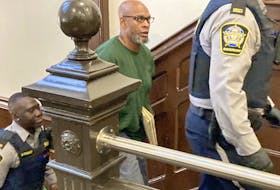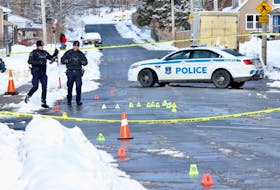GATINEAU, Que. — The final report of the national inquiry into missing and murdered Indigenous women, girls, “Reclaiming Power and Place,” compiled information gathered during coast-to-coast hearings and testimony from more than 2,000 family members, survivors of violence, and experts.
Here are some of their stories, republished from the report and edited for length.
Kimberly J.
"There are youth who have forgotten whether they are Inuit. They ask, “Am I Inuit or am I not?”
Within Inuit communities, the report says, the crisis of child welfare is “exacerbated by distance and the way in which Inuit children and youth are often sent south to encounter a completely different way of life.” The mistrust of many Inuit for colonial systems and laws is also heightened by the relatively recent experiences of relocation and colonization in the North. Harriet (Rutie) and her husband Johannes L. of Nain, Labrador, spoke to this, in memory of their daughter Kimberley J., who was murdered by her boyfriend at age 20.
“And then there are, like, certain families who live in poverty, who don’t have the means to support their children and grandchildren and do not have enough money to support their families. And this is because the education system has taken children away from their Inuit families as if education – the education system has become more responsible for the children, for the education of the children, so that responsibility has been taken away from Inuit; so our culture, our language is no longer being taught to our Inuit children and grandchildren. Our Inuit way of being – is being used less and so our way of life has been diminished. There are youth who have forgotten whether they are Inuit. They ask, “Am I Inuit or am I not?”
Victoria P.
“Nobody is listening. Nobody seems to care. There’s no wrongdoing of the police in this country.”
Families and supporters of Victoria P., a woman who suffered a stroke while in custody of the Truro Police Force, spoke to the National Inquiry about the relationship between Indigenous Peoples and the criminal justice system. In describing the events leading up to Victoria’s death, family support person, advocate, and past president of the Nova Scotia Native Women’s Association Cheryl M. emphasized a single encounter between the officers on duty and Victoria. In this encounter, the senior officer on duty told the junior officer who expressed concern about Victoria’s condition that “if you get a grunt, that’s good enough.”
“Nobody is listening. Nobody seems to care. There’s no wrongdoing of the police in this country,” Cheryl said.
“[Victoria] went into the Truro police cell and she came out on life support and died.”
Darlene G.
"Why I used and drank the way I used, it’s because of systemic abuse, generational abuse, the government trying to change who we are.”
Darlene G. -- a First Nations woman and survivor of childhood abuse and sexual violence -- told the comission during Community Hearing in Membertou, Nova Scotia about conversation with her uncle in which she learned about her mother’s history of abuse within the residential school system. She said it was in this conversation with her uncle that she was given new path to healing through understanding both her own and her mother’s struggles with addiction.
“My life really alters at [Uncle V.]. He’s been my rock, you know. He sat at a table one day. At my Auntie [R.]’s funeral, we were all sitting out in the back of my Uncle [L.]’s house and we’re around the table and I was clean and sober. I was five years. And he looked at me, and he says, “Do you want to know why your mother was the way she was with you? Do you want to know why your mother was the way your mother was, no feeling, cold? Because she was raped by the priests.” I couldn’t understand that, but I could understand why she was the way she was, why she drank, she – the way she drank. Why I used and drank the way I used, it’s because of systemic abuse, generational abuse, the government trying to change who we are.”
Monique F.H.
"I think he seen something – the potential of me living a different life and he gave me the break that I needed.”
Monique F. H. described in her testimony how she was living at a women’s shelter, injecting and drinking every day, and found herself on and off the street. Having been sexually abused as a child and engaged in violent relationships throughout her life, Monique made the decision, at her stepfather’s urging, to rejoin her family in Halifax. She told the commission the moment that she made the decision to do so was transformational. Monique eventually became an HIV advocate for women and a social worker. She currently works for CAAN, the Canadian Aboriginal AIDS Network.
“So I phoned one of the pawnshop guys that I knew, because with my life I knew a lot of people, and I asked him, I said, “Come and buy everything … that I have, and get me a ticket to Halifax.” And he did. He took all my stuff and he gave me a ticket. I know that I did not have anything worth any kind of money, but I think he seen something – the potential of me living a different life and he gave me the break that I needed.”









